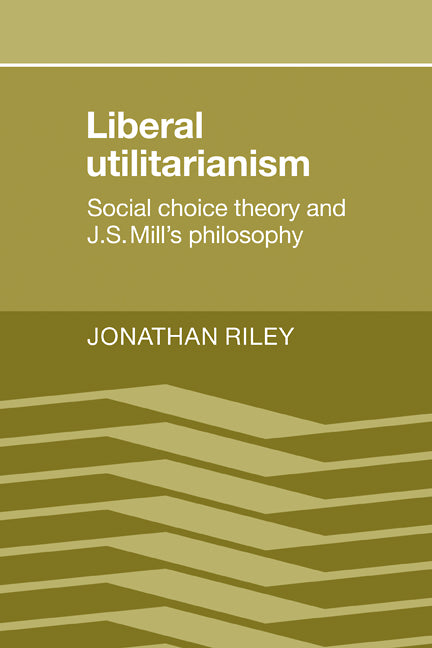Freshly Printed - allow 8 days lead
Couldn't load pickup availability
Liberal Utilitarianism
Social Choice Theory and J. S. Mill's Philosophy
This is a book about liberal democratic values and their implications for the design of political institutions.
Jonathan Riley (Author)
9780521109512, Cambridge University Press
Paperback / softback, published 19 February 2009
416 pages
22.9 x 15.2 x 2.3 cm, 0.7 kg
'Jonathan Riley's reinterpretation of Mill is both original and important. The motivation for the reinterpretation relates to issues raised by modern political philosophy and social choice theory. The approach thus developed helps in providing an interesting and rather far-reaching reassessment of Mill in particular and liberal utilitarianism in general.' Amartya Sen
This is a book about liberal democratic values and their implications for the design of political institutions. Its distinctive feature is the use of some simple mathematical techniques (known as social choice theory) to clarify and defend a rather complex utilitarian conception of the liberal democratic 'way of life' based on John Stuart Mill's work. More specifically, the text focuses on three well-known 'social choice paradoxes' which are commonly held to destroy any possibility of an ideal harmony among liberal democratic values; and draws upon suggestions implicit in Mill's writings to develop an ethically appealing liberal democratic social choice framework in which the aforementioned paradoxes no longer cause concern. The revised framework is a rather complex version of utilitarianism and should be of special interest to welfare economists, social choice theorists, democratic political theorists and philosophers concerned with utilitarian ethics.
Preface
1. Introduction
Part I. Social Choice Theory and Utilitarianism: 2. Arrow's ordinal utilitarian social welfare functions
3. The Benthamite utilitarian social welfare functional
4. Some criticisms of Benthamite utilitarianism
5. The liberal utilitarian generalised social welfare functional
6. An ideal utilitarian social welfare functional
Part II. Mills Utilitarianism: 8. Distinct kinds of utility
9. Utility in the largest sense
Part III. Some Implications for Liberal Democratic Theory: 10. Responses to Gibbard's rights-exercising paradox
11. Responses to Sen's Paretian liberal paradox
12. On the design of democratic political institutions
13. Epilogue
Notes
Bibliography
Index.
Subject Areas: Economic theory & philosophy [KCA]


